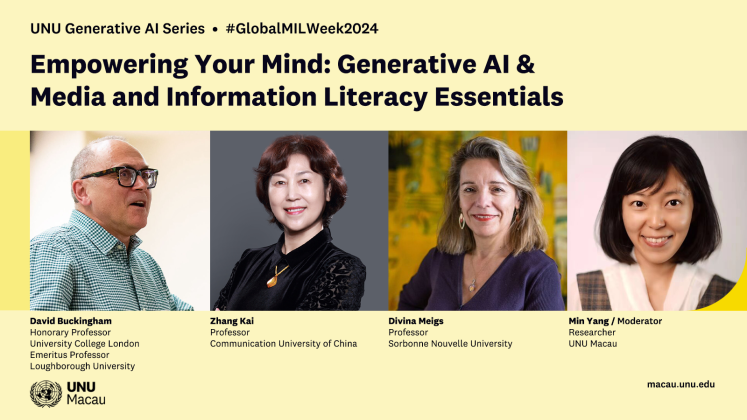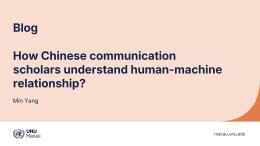The United Nations University Institute in Macau (UNU Macau) organized a webinar on October 25, 2024, focusing on generative artificial intelligence (GenAI) and media & information literacy (MIL1HideMIL is a compound conceptual framework introduced by UNESCO in 2013. It brings together several interrelated concepts-such as information literacy, media literacy, ICT and digital and other related aspects-under one umbrella concept.). As part of the UNESCO Global Media & Information Literacy Week celebrations, the webinar aimed to increase people’s awareness of MIL to enable them to respond to emerging challenges posed by artificial intelligence (AI) and take advantage of opportunities to participate more effectively in society. The webinar featured Professor David Buckingham, Professor Zhang Kai, and Professor Divina Frau-Meigs as speakers and included participants from around the world. This blog captures key insights from the speakers on how MIL empowers individuals to better navigate the rapidly changing digital world.
This blog captures key insights from the speakers on how MIL empowers individuals to better navigate the rapidly changing digital world.
AI is transforming our world in remarkable ways but also introduces concerns and threats, especially around biases, fake news, misinformation, privacy invasion, and surveillance concerning media and information. As highlighted by Professor David Buckingham, old media challenges take on a new emphasis with AI. For instance, established jobs are disappearing with the restructuring of the media industry. As AI generates more and more content, concerns about copyright and intellectual property are increasing.
In responding to these developments, Professor David Buckingham emphasized the importance of media education that is not just about teaching with or through media but about teaching about media itself2Hidehttps://davidbuckingham.net/2023/05/27/artificial-intelligence-in-education-a-media-education-approach/. Media education aims to apply a critical framework in classrooms and other settings based on four key concepts: production, language, representation, and audience.
Media education aims to apply a critical framework in classrooms and other settings based on four key concepts: production, language, representation, and audience.
Professor David Buckingham suggested a series of questions for educators and individual users when using AI: What are the consequences of media business models? How transparent is AI technology? What are the methods of turning data into meaningful communication? How far we can trust AI and what AI is producing for us? His approach advocates that media educators need a very well-established pedagogical technique of positioning students and users as media content producers, and getting them to systematically analyze AI’s wider social implications.
AI is changing how information is generated, disseminated, and consumed. How can individual users outside of technology sectors become more productive rather than overwhelmed by these developments? Professor Zhang Kai emphasized the need for information literacy. In the AI era, the notion of information literacy has extended from basic skills to access, evaluate, and use information effectively to developing critical skills that enable people to understand how AI works and what AI produces, and to engage responsibly with AI-mediated information.
Addressing the emerging challenges associated with AI, as outlined by Professor David Buckingham, Professor Zhang Kai emphasized human responsibilities and the power to shape AI and ensure a future where both humans and AI can thrive. She stated that collaboration between humans and AI can be productive when humans provide context, judgment, and ethical oversight, while AI contributes to efficiency, pattern recognition, and scalability. Humans should define the boundaries of AI’s capabilities, ensuring that AI serves societal interests and respects privacy, fairness, and security. AI development should be guided by human values and ethical frameworks.
In addition, Professor Zhang Kai highlighted the mutual evolution of humans and AI, noting that AI development relies on user feedback and that society changes as it learns to live with AI innovations. She suggested incorporating more user perspectives into AI research and practice. Users who understand how AI processes, filters, and presents information can actively contribute to AI design, regulation, and development rather than being passive adapters. With information literacy, users can critically access AI-driven outputs in various forms. To build information literacy, she suggested that individuals prioritize upgrading specific competencies including making informed decisions, combating misinformation, and developing ethical awareness and critical thinking skills.
Professor Divina Frau-Meigs introduced four core macro competencies of MIL to respond to AI-related risks: skills, knowledge, attitude, and value. She described them as the wings of a butterfly and removing one of them will prevent the butterfly from flying. “Users need all four competencies together and they cannot be prioritized one over the others”, emphasized Professor Divina Frau-Meigs.
‘Users need all four competencies together and they cannot be prioritized one over the others’, emphasized Professor Divina Frau-Meigs.
At the implementation level, these four macro competencies need to be expanded and translated into 24 micro competencies for users, practitioners, young people, and teachers. Around these competencies, questions could be asked to make AI more understandable, explainable, and transparent for users, regulators, and business practitioners, such as questions about the regulations governing AI, methods of data processing, and data sources for verifying truth.
At the end of her presentation, Professor Divina Frau-Meigs alerted users to potential risks by using terms of human characteristics. AI is not human, has no decision-making power and does not experience emotions and feelings as humans do. However, some existing terms such as “conversation”, “hallucination”, “agent” might cause confusion about what AI is and what it can do. Therefore, she suggested that media literacy practitioners and teachers should urgently propose an alternative glossary of terms to integrate into teaching curriculums, such as using “mechanical manipulation of symbols” instead of “conversation” or “data retrieval tool” instead of “agent”, etc.
AI, particularly GenAI, has a significant impact on people’s engagement with media and information. Users should critically assess technology while using and benefiting from it. As emphasized by three speakers, we need to enhance critical understanding of the wider social, economic and ethical implications of AI. This will help us better recognize the challenges and risks associated with AI, manage them, and adopt responsible practices in navigating the digital world, in line with the core values and requirements of MIL.
Suggested citation: Min Yang., "Empowering Your Minds: Generative AI & Media and Information Literacy Essentials," UNU Macau (blog), 2024-11-14, 2024, https://unu.edu/macau/blog-post/empowering-your-minds-generative-ai-media-and-information-literacy-essentials.





